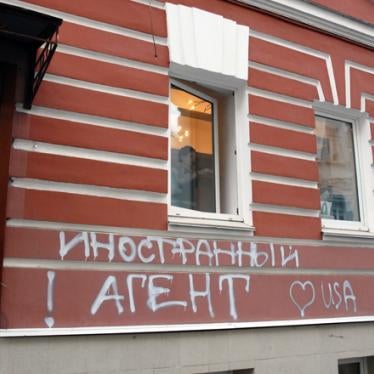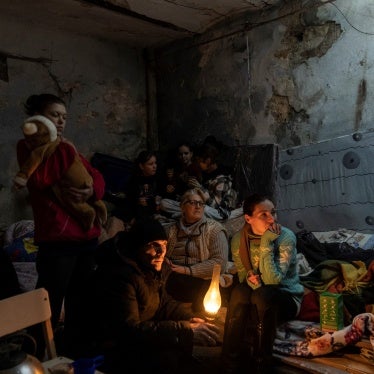(Moscow) – The Russian government has branded five prominent independent groups as “foreign agents,” Human Rights Watch said today. The government’s actions are part of its biggest crackdown on the rights to free expression and association in Russia since the end of the Soviet era.
On July 21, 2014, the Justice Ministry announced that it had registered four human rights organizations and one environmental group as “foreign agents.” The groups are Memorial Human Rights Center, Public Verdict Foundation, and JURIX in Moscow; AGORA in Kazan; and Women’s Council Environmental Protection (Ecozaschita-Zhensovet) in Kaliningrad. The Justice Ministry said the groups had engaged in “political activities” while receiving foreign funding, and therefore had to be registered under Russia’s law on “foreign agents.”
“The Russian government, by branding these five important groups as ‘foreign agents,’ has taken a major step toward destroying independent activism in the country,” said Hugh Williamson, Europe and Central Asia director at Human Rights Watch.
In mid-July Russian media reported that the government was seeking to further toughen the law by banning public officials from contact with “foreign agent” groups.
On July 22, President Vladimir Putin, addressing a meeting of Russia’s Security Council, specifically referred to “pocket nongovernmental organizations” as a tool allegedly used by outside forces to weaken Russia and identified this as one of “the challenges” to which Russia should “react.”
Russia’s “foreign agents” law, adopted in July 2012, requires nongovernmental organizations that accept foreign funding and engage in “political activity” to register as “foreign agents,” a term commonly understood in Russia to mean foreign spies and traitors. The law defines political activity so broadly as to allow government control over just about any organized activity relating to public life. Not a single advocacy group has registered, and instead dozens have been fighting through the courts the efforts by the authorities to force them to register. In response, in May 2014, parliament amended the law, giving the Justice Ministry the authority to register groups as “foreign agents” at its own discretion, without their consent.
On June 9, five days after President Vladimir Putin signed the amendments into law, the Justice Ministry promptly registered the first five groups, four of which had lost their court cases. Of the five groups the Justice Ministry added to its “foreign agents” registrar on July 21, bringing the total number on the registry to ten, four were in the process of challenging the authorities in courts. The Memorial Human Rights Center, Public Verdict Foundation, AGORA, and JURIX are particularly well known for providing legal aid to victims of political manipulation of justice; persecuted civil society activists and peaceful protesters; lesbian, gay, bisexual, and transgender (LGBT) activists; and victims of police violence. All of them are active in strategic litigation and frequently quoted in the media.
The head of the Public Verdict Foundation, Natalia Taubina, received the Human Rights Watch prestigious Alison des Forges Award for Extraordinary Activism in 2013. A leading North Caucasus researcher for Memorial, Natalia Estemirova, had received this award in 2007. There has been no effective investigation by Russian authorities of Estemirova’s brazen killing in July 2009, and the murder remains unpunished.
Representatives of the five groups deemed “foreign agents” on July 21, 2014, told Human Rights Watch they will appeal the ministry’s decision in domestic courts but are largely placing their hopes with the European Court of Human Rights. Thirteen Russian rights groups, including several of those now officially recognized as “foreign agents,” have lodged a joint complaint with the European Court. More groups are likely to sign on in the near future as victims of Russia’s controversial law on “foreign agents.”
“Russian authorities leave no doubt that the law on ‘foreign agents’ was introduced and fine-tuned as a tool to destroy advocacy groups and stifle free expression,” Williamson said. “Russia’s international partners should call on Russia in one voice to repeal this ugly law.”







